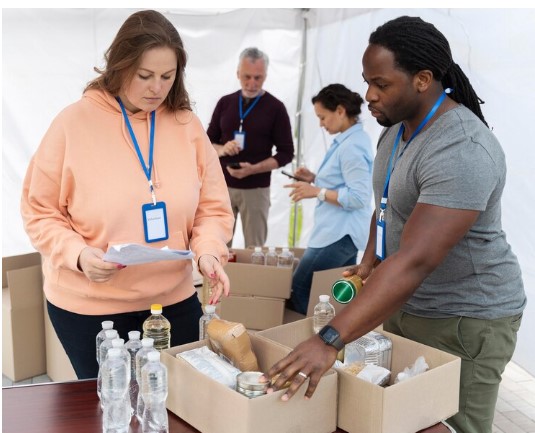Traveling with a humanitarian organization offers a unique opportunity to immerse oneself in diverse cultures while contributing to sustainable solutions for communities in need. Participants often find that these trips provide not only assistance to others but also a profound personal experience, broadening their understanding of the world and its array of challenges. Engaging in humanitarian travel allows individuals to step out of their comfort zones, collaborate with people from different backgrounds, and work towards a shared mission of hope and positive change.
Before embarking on a journey with a humanitarian group, travelers must prepare extensively, ensuring they are mentally and physically ready for the tasks ahead. This involves understanding the practical aspects of humanitarian travel, such as obtaining the necessary visas, vaccinations, and understanding the local customs and language to some extent. It is crucial that volunteers consider how their efforts align with the organization’s goals and how they can contribute effectively on the ground.
Key Takeaways
- Humanitarian travel promotes cultural diversity and sustainable community aid.
- Comprehensive preparation is essential for effective on-the-ground volunteer engagement.
- Reflection and sharing post-trip experiences contribute to personal growth and awareness raising.
Preparing for Humanitarian Travel
Prior to embarking on a journey with a humanitarian organization, it’s paramount to understand the mission, choose the appropriate organization, and prepare necessary travel documentation.
Understanding the Mission and Goals
Humanitarian travel revolves around supporting communities and contributing to a larger cause. Volunteers should align with the mission of the organization to ensure their efforts are impactful and meet the community’s needs.
Selecting the Right Humanitarian Organization
When preparing to join humanitarian endeavors, one should scrutinize organizations to find one whose values resonate with their own. It’s important to engage with groups that have a transparent history of positive impact and community involvement.
Cultural Sensitivity and Language Preparation
Understanding the culture of the destination is crucial. Volunteers must respect local customs and, if possible, acquire a basic grasp of the language to foster better community interaction and effectiveness.
Managing Travel Documentation
Travel documents, including a current passport and knowledge of visa requirements, are the foundation of preparing for humanitarian travel. Ensuring documents are in order well ahead of planned travel can prevent delays and complications. Obtaining the best airfare options, such as reviewing tips on booking flights and exploring humanitarian airfares, can also maximize the resources dedicated to the mission at hand.
Practical Aspects of Humanitarian Travel
Traveling with a humanitarian organization requires careful planning, especially regarding what to pack and how to approach health and safety. Making informed decisions can lead to a safer and more effective mission.
Packing Essentials and Baggage Allowance
When embarking on humanitarian travel, packing essentials must be prioritized due to airline baggage allowances. Check with the airline for specific humanitarian baggage allowances as these may allow for additional supplies. Begin with a checklist which should include:
- Personal medications and first aid items.
- Clothing suited for local weather and cultural sensitivity.
- Essential documents such as passports, visas, and immunization records.
Sustainable packing practices such as using a single multipurpose gadget instead of multiple single-function devices save space and weight. Always prepare for restrictions on liquids and sharp objects in carry-on luggage.
Healthcare and Safety Considerations
Before traveling, ensure that your healthcare needs are thoroughly planned. This pertains to arranging travel insurance which should cover accidents and unexpected medical assistance. Vaccinations may be necessary depending on the destination.
As safety is paramount, research your destination’s safety landscape—seasonal weather patterns, political stability, and prevalent health hazards. Keep emergency contacts handy at all times. Staying safe also involves respecting local customs and abiding by the laws, creating a secure environment for oneself and the community assisted.
On the Ground: Engaging with Communities
Traveling with a humanitarian organization requires direct involvement with the communities you aim to support. This on-the-ground engagement is the foundation for building enduring connections and fostering hope among local populations.
Building Connections and Fostering Hope
Volunteers form the bridge between humanitarian efforts and individual needs, reaching out to establish trust and rapport with community members. This endeavor goes beyond mere presence; it requires an active listening approach and cultural sensitivity. Creating a meaningful impact often starts with simple, yet profound interactions that foster hope in times of hardship.
Community Development and Sustainable Practices
Long-term community development hinges on sustainable practices that empower locals to continue progress even after the volunteers leave. Humanitarian efforts focus on education and skills training that uphold the community’s self-sufficiency. By introducing sustainable methods in areas such as agriculture, water management, and small-scale entrepreneurship, communities are equipped to face future challenges independently.
Working with Children and Families
The well-being of children and families is paramount in any community’s success story. Humanitarian organizations place a significant emphasis on protecting and nurturing the younger generation, providing resources for education, healthcare, and safe living conditions. Volunteers play a crucial part in these efforts, often becoming role models and support figures for both children and parents striving to rebuild and strengthen their family units.
Engaging with communities on the ground is at the heart of meaningful humanitarian work. It requires a blend of compassion, adaptability, and a commitment to fostering lasting change through connections, hope, and the sustainable development of communities.
After the Trip: Sharing the Experience
Once volunteers have returned from their mission trip or humanitarian efforts, the journey is far from over. It’s critical they reflect on the development work accomplished, the culture they encountered, and the relationships they forged to reinforce the benefits and learnings for the future.
Debriefing and Continuing Support
Coming back from volunteering opportunities abroad, individuals often need to process the authentic experiences they’ve had. Debriefing sessions provide a structured way for participants to articulate what they’ve learned, the challenges they faced, and the milestones achieved during the mission trip. Encouraging volunteers to stay connected with the organization offers them continuing support for cultural reintegration and further aids in personal development.
Leveraging Social Media and Stories
For sharing the profound impact of their journey, social media serves as a powerful platform. Volunteers can use impactful stories, photos, and updates to engage with friends, partners, and broader networks, inspiring others to support or pursue similar volunteer opportunities. Crafting narratives about their experiences helps to educate and inform their audiences about the culture and meaningful work of their mission trip. It’s essential to share these stories with sensitivity and respect for the communities involved.
Strategically sharing these stories can bolster ongoing support for the cause. For example, details about an immersive experience with a local community might reference practical travel advice they found useful or insights gained during a court process while adopting that others in similar situations might benefit from.
By focusing on the transformative nature of their journey and its larger implications, volunteers contribute to a culture of awareness and philanthropy even after they’ve returned home.









